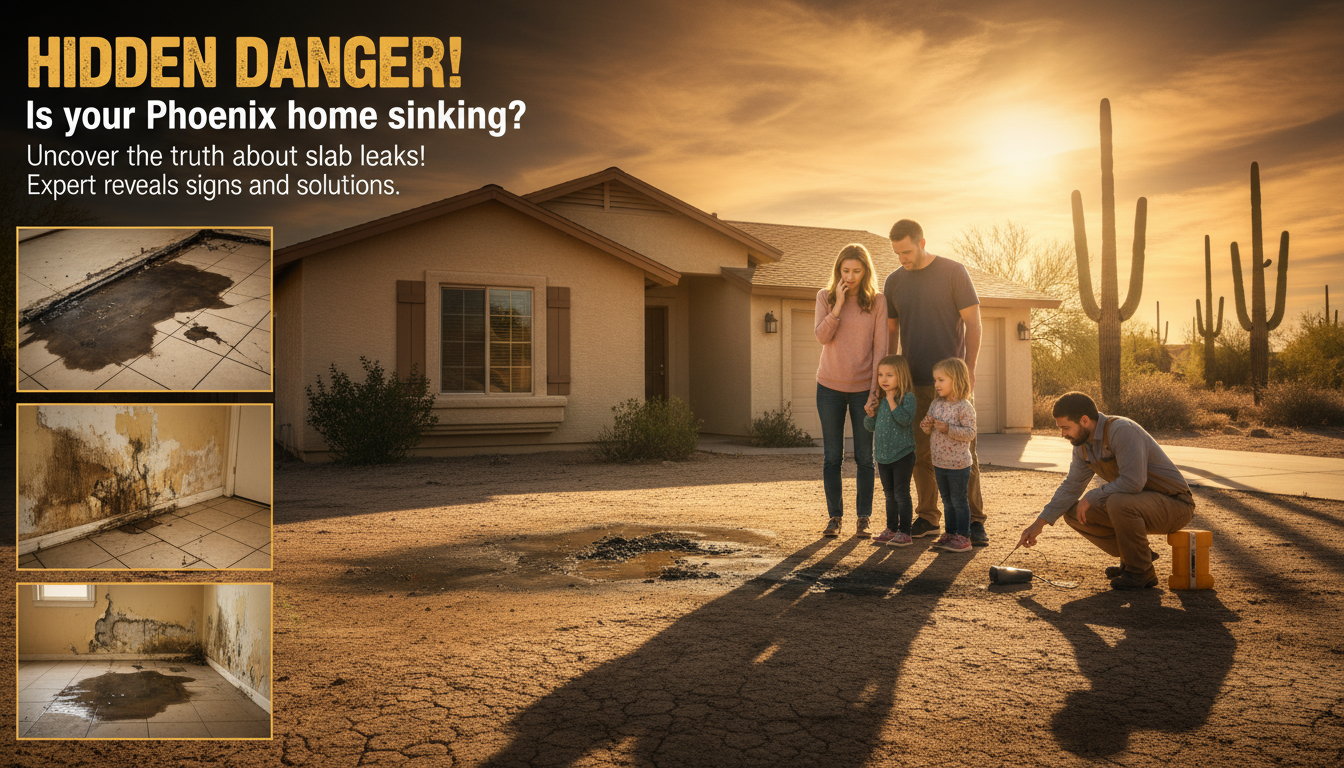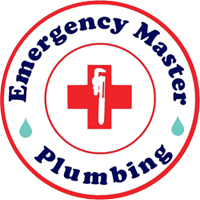

Slab leaks can turn a cozy Phoenix home into a costly nightmare if left unchecked. As a resident in the Valley of the Sun, you might not think much about the plumbing hidden beneath your concrete foundation, but these hidden leaks are more common than you’d expect, especially with Arizona’s unique soil and water conditions. In this comprehensive guide, we’ll dive into what slab leaks are, their common causes, telltale signs to watch for, and effective repair options tailored to Phoenix homeowners. Whether you’re dealing with a sudden spike in your water bill or noticing odd warm spots on your floor, understanding slab leaks can help you act fast and prevent extensive damage. We’ll also share practical tips to solve these issues and keep your home safe.
By addressing slab leaks early, you can avoid foundation cracks, mold growth, and skyrocketing repair costs. Drawing from expert insights and local experiences, this post aims to equip you with the knowledge to identify problems and choose the right solutions. Let’s break it down step by step.
What Is a Slab Leak?
A slab leak occurs when water pipes buried beneath your home’s concrete foundation—known as the slab—begin to leak or break. These pipes carry water to and from your faucets, appliances, and fixtures, but when they fail, water seeps into the surrounding soil and concrete. This isn’t just a minor drip; it can lead to structural damage, higher utility bills, and health hazards like mold.

In Phoenix, Arizona, slab leaks are particularly prevalent due to the region’s expansive clay soils, which expand and contract with moisture changes, putting extra stress on underground pipes. Hard water, rich in minerals, also accelerates pipe corrosion here. If you’re in an older home built before modern plumbing standards, your risk increases, as materials like galvanized steel or cast iron are prone to wear. Recognizing this early can save you thousands—repairs in Phoenix typically range from $600 to $4,000, depending on the severity.
Common Causes of Slab Leaks in Phoenix
Understanding why slab leaks happen is the first step in prevention and repair. Several factors contribute, many amplified by Phoenix’s desert climate and geology. Here’s a closer look at the primary culprits.
Pipe Corrosion and Chemical Reactions
Corrosion is one of the leading causes, especially in older Phoenix homes with metal pipes. Over time, chemical reactions between the pipes and surrounding soil or water weaken the material. In Arizona, high mineral content in water—often called hard water—corrodes pipes from the inside out. Externally, alkaline soil and concrete can eat away at pipes, creating pinhole leaks that worsen over years. If your home was built before the 1990s, it might use outdated materials like cast iron, which rust and clog easily.
Soil Shifts and Expansion
Phoenix’s clay-rich soils are notorious for expanding when wet and shrinking when dry, a process that exerts tremendous pressure on buried pipes. This shifting can crack or burst lines, leading to leaks. Local factors like monsoons or irrigation systems exacerbate the issue, as sudden water absorption causes rapid expansion. Earthquakes, though rare in Arizona, or even underground streams and tree roots can add external pressure, abrading pipes against concrete or soil.
Abrasion from Movement and Friction
Pipes aren’t static; they expand and contract with temperature changes, rubbing against the slab, gravel, or other pipes. In hot Phoenix summers, this friction intensifies, wearing down pipe walls over time. High water pressure, common in some municipal systems, stresses joints and connections, accelerating abrasion.
Poor Installation or Materials
Substandard construction is a hidden danger. If pipes were improperly laid, kinked, or made from low-quality materials during your home’s build, they’re more likely to fail early. Newer homes often use durable options like PVC, CPVC, or PEX, which resist corrosion better. However, even these can suffer if installation skimps on insulation or proper support.
High Water Pressure and Aging Infrastructure
Excessive pressure strains the entire plumbing system, a problem in areas with variable water supply. Combined with Phoenix’s older neighborhoods, where pipes might be decades old, this creates a perfect storm for leaks. Water chemistry imbalances, like overly acidic or alkaline conditions, further corrode pipes internally.
These causes often interplay—for instance, soil shifts might abrade already corroded pipes. Regular plumbing inspections can catch vulnerabilities before they escalate.
Signs You Have a Slab Leak: Don’t Ignore These Red Flags
Slab leaks are sneaky, often going unnoticed until damage is severe. Spotting early signs can prevent foundation issues and mold. Here are key indicators, with Phoenix-specific notes.
Sudden Increase in Water Bills
An unexplained spike in your water bill is a classic warning. If usage hasn’t changed but costs have risen, water might be leaking underground. In Phoenix, where water rates are high due to conservation efforts, this can add hundreds to your monthly expenses.
Low Water Pressure Throughout the Home
If showers feel weak or appliances take longer to fill, a leak could be diverting water. This is especially noticeable in multi-story homes or during peak usage times.
Sounds of Running Water When None Is On
Hearing water trickling or rushing with all taps off? It’s a telltale sign of a hidden leak. Listen closely at night when it’s quiet.
Warm or Wet Spots on Floors
Feel a hot spot while walking barefoot? It could be from a leaking hot water line. Wet or damp areas on carpets, tiles, or hardwood indicate moisture seeping up. In Phoenix’s dry climate, these spots stand out and can lead to warped flooring quickly.
Foundation Cracks and Structural Damage
Visible cracks in walls, baseboards, or the foundation itself often result from soil erosion caused by leaks. Water pushes up, creating uneven settling—common in Phoenix due to expansive soils.
Mold, Mildew, or Musty Odors
Persistent dampness fosters mold growth, producing a musty smell. Discolored or warped floors and uneven lawn growth near the foundation (greener patches from extra water) are additional clues.
Standing Water or Soil Shifts Outside
Puddles around your home’s perimeter or depressions in the yard signal water escaping and eroding soil. In Phoenix, this can worsen during rainy seasons.
If you notice multiple signs, act immediately—a professional leak detection can confirm and locate the issue without tearing up your home.
Repair Options for Slab Leaks in Phoenix
Once detected, slab leaks require prompt repair. Options vary by severity, location, and budget. In Phoenix, local pros like those familiar with Arizona’s soil often recommend methods that minimize disruption.
Professional Detection First
Start with advanced detection using listening devices or cameras to pinpoint the leak without unnecessary digging. Costs for this in Phoenix average $200-$500, but it’s essential for accurate repairs.
Spot Repair: Jackhammer and Replace
For isolated leaks, plumbers jackhammer through the concrete, excavate soil, cut out the damaged pipe section, and install a new one with couplings. Pipes are brazed for durability, and the area is wrapped to protect against future issues. This is cost-effective for minor problems, ranging from $600 to $2,000.
Rerouting Pipes
A popular option in Phoenix due to poor soil and water quality, rerouting bypasses the slab by running new lines through walls and ceilings. This eliminates underground risks on that line, ideal for recurring issues. It avoids extensive concrete work but may cost $2,000-$4,000.
Epoxy Pipe Lining or Repiping
For corrosion-heavy cases, epoxy lining seals pipes internally without excavation. Full repiping replaces all underground lines, a more invasive but long-term fix, especially in older homes.
Choose based on a pro’s assessment—reroutes are often preferred here to prevent future leaks. Always opt for licensed plumbers with upfront pricing and guarantees.
Preventing Slab Leaks: Tips for Phoenix Homeowners
Prevention beats repair. Monitor water pressure (keep it under 80 PSI), schedule annual inspections, and soften hard water to reduce corrosion. Use drought-resistant landscaping to minimize soil shifts, and avoid planting trees near foundations. For new builds, insist on quality materials like PEX.
When to Call a Professional in Phoenix
Slab leaks demand expert handling to avoid further damage. If you’re in Phoenix and suspect an issue, contact a trusted local service for reliable detection and repair.
For top-notch assistance, we recommend Emergency Master Plumbing & Air. With their expertise in slab leak repairs and 24/7 availability, they can diagnose and fix your problem efficiently. Call them at 623-584-4706 to schedule a consultation and protect your home today.
